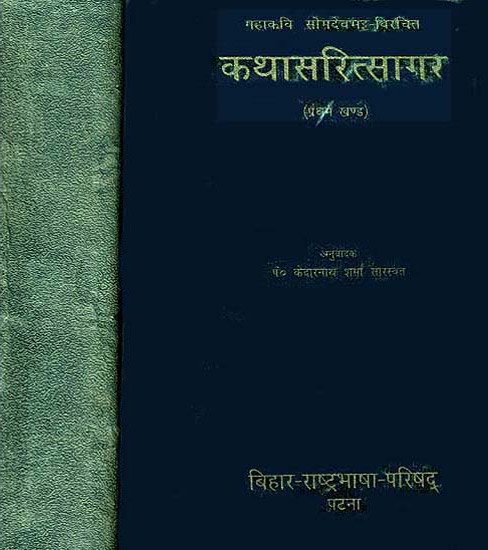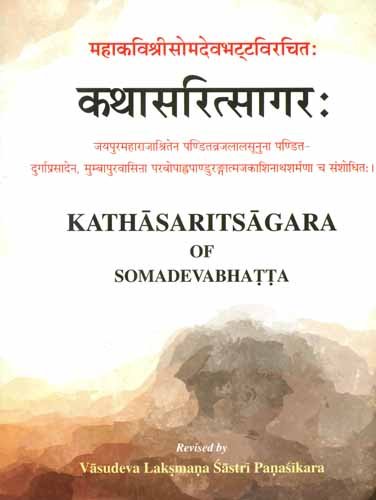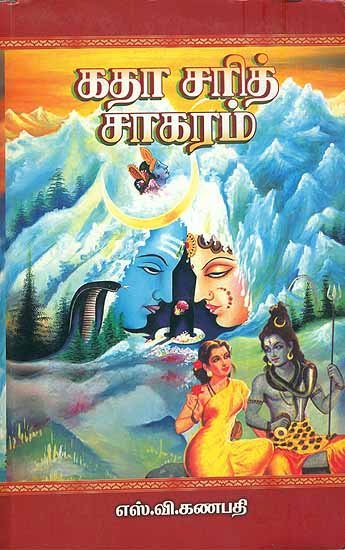Kathasaritsagara [sanskrit]
by C. H. Tawney | 2014 | 226,424 words | ISBN-13: 9789350501351
The Sanskrit edition of the Kathasaritsagara referencing the English translation and grammatical analysis. Written by Somadeva and dating from the 12th century, the Kathasaritsagara (or Katha-sarit-sagara) represents an epic legend narrating the adventures of Naravahanadatta as he strives to become the destined emperor of the Vidyadharas. Alternative titles: (Kathāsaritsāgara, कथासरित्सागर, Kathā-sarit-sāgara)
Verse 9.6.424
इत्यात्ममन्त्रिमरुभूतिमुखान्निशम्य चित्रां कथामनुपमामनुरागरम्याम् ।
रामासखः स नरवाहनदत्तदेवो वत्सेश्वरस्य तनयो भृशमभ्यतुष्यत् ॥ ४२३ ॥
ityātmamantrimarubhūtimukhānniśamya citrāṃ kathāmanupamāmanurāgaramyām |
rāmāsakhaḥ sa naravāhanadattadevo vatseśvarasya tanayo bhṛśamabhyatuṣyat || 423 ||
The English translation of Kathasaritsagara Verse 9.6.424 is contained in the book The Ocean of Story by C.H. Tawney. This book is available online or you could buy the latest edition:
Read online Buy now! The English translation by C.H. Tawney (2014)
Glossary of Sanskrit terms
Note: This extracts Sanskrit terms and links to English definitions from the glossary, based on an experimental segmentation of verse (9.6.424). Some terms could be superfluous while some might not be mentioned. Click on the word to show English definitions.
Itya, Tri, Bhuti, Ukha, Nisham, Nisha, Citra, Katha, Anupama, Anuraga, Ramya, Rama, Sakha, Naravahanadatta, Deva, Devri, Vatseshvara, Tanaya, Bhrisham, Bhrisha, Abhi,
Analysis of Sanskrit grammar
Note: this is an experimental feature and only shows the first possible analysis of the Sanskrit text (Kathasaritsagara Verse 9.6.424). If the system was successful in segmenting the sentence, you will see of which words it is made up of, generally consisting of Nouns, Pronouns, Verbs, Participles and Indeclinables. Click on the link to show all possible derivations of the word.
- Line 1: “ityātmamantrimarubhūtimukhānniśamya citrāṃ kathāmanupamāmanurāgaramyām ”
- ityāt -
-
itya (noun, masculine)[adverb], [ablative single]itya (noun, neuter)[adverb], [ablative single]√i -> itya (participle, masculine)[ablative single from √i class 2 verb]√i -> itya (participle, neuter)[ablative single from √i class 2 verb]
- maman -
-
mamā (noun, feminine)[adverb]
- trim -
-
tri (noun, masculine)[accusative single]
- aru -
-
aru (noun, masculine)[compound], [adverb]
- bhūtim -
-
bhūti (noun, feminine)[accusative single]bhūti (noun, masculine)[accusative single]
- ukhān -
-
ukha (noun, masculine)[adverb], [accusative plural], [ablative single]
- niśam -
-
niśam (indeclinable)[indeclinable]niśa (noun, neuter)[adverb], [nominative single], [accusative single]niśā (noun, feminine)[adverb]
- ya -
-
- citrām -
-
citrā (noun, feminine)[accusative single]
- kathām -
-
kathā (noun, feminine)[accusative single]
- anupamām -
-
anupamā (noun, feminine)[accusative single]
- anurāga -
-
anurāga (noun, masculine)[compound], [vocative single]
- ramyām -
-
ramyā (noun, feminine)[accusative single]√ram -> ramyā (participle, feminine)[accusative single from √ram class 1 verb], [accusative single from √ram]
- Line 2: “rāmāsakhaḥ sa naravāhanadattadevo vatseśvarasya tanayo bhṛśamabhyatuṣyat ”
- rāmā -
-
rāmā (noun, feminine)[nominative single]
- sakhaḥ -
-
sakha (noun, masculine)[nominative single]
- sa -
-
sa (noun, neuter)[compound], [vocative single]sa (noun, masculine)[nominative single]
- naravāhanadatta -
-
naravāhanadatta (noun, masculine)[compound], [vocative single]
- devo* -
-
deva (noun, masculine)[nominative single]devṛ (noun, masculine)[vocative single]
- vatseśvarasya -
-
vatseśvara (noun, masculine)[genitive single]
- tanayo* -
-
tanaya (noun, masculine)[nominative single]
- bhṛśam -
-
bhṛśam (indeclinable)[indeclinable]bhṛśa (noun, masculine)[adverb], [accusative single]bhṛśa (noun, neuter)[adverb], [nominative single], [accusative single]bhṛśā (noun, feminine)[adverb]
- abhya -
-
abhi (indeclinable preposition)[indeclinable preposition]abhi (noun, masculine)[compound], [adverb], [nominative dual], [vocative dual], [accusative dual]abhi (noun, neuter)[compound], [adverb], [nominative single], [vocative single], [accusative single]abhi (noun, feminine)[compound], [adverb], [nominative dual], [vocative dual], [accusative dual]abhī (noun, masculine)[compound], [adverb]abhī (noun, neuter)[compound], [adverb], [nominative single], [vocative single], [accusative single]abhī (noun, feminine)[compound], [adverb]abhi (Preverb)[Preverb]
- atuṣyat -
-
√tuṣ (verb class 4)[imperfect active third single]
Other editions:
Also see the following editions of the Sanskrit text or (alternative) English translations of the Kathasaritsagara Verse 9.6.424
Kathasaritsagar
by Kedarnath Sharma Saraswat (2005)
The Only Edition with the Sanskrit Text and its Hindi Translation (An Old and Rare Book) Set of 3 Vol.
Buy now!
Kathasaritsagara of Somadeva Bhatta (Sanskrit Text Only)
by Vasudeva Laksmana Sastri (2013)
Katha Sarit Sagar in Marathi
by H. A Bhave (1995)
Set of 5 Volumes; Published by Varada Books, Pune. 2256 pages (Throughout B/W Illustrations).
Buy now!
Katha Sarit Sagara (Tamil)
by S. V. Ganapati (எஸ். வி. கணபதி) (2014)
[கதா சரித் சாகரம்] Published by Alliance Publications.
Buy now!
Galpa Shono
by Abhijit Chattopadhyay (2014)
[গল্প শোনো] Galpa Shono: Bengali Translation of 'Suno Kahani From Katha Sarit Sagar'; 9788126015436; Published by Sahitya Akademi, Delhi.
Buy now!Preview of verse 9.6.424 in Bengali sript:
ইত্যাত্মমন্ত্রিমরুভূতিমুখান্নিশম্য চিত্রাং কথামনুপমামনুরাগরম্যাম্ ।
রামাসখঃ স নরবাহনদত্তদেবো বত্সেশ্বরস্য তনযো ভৃশমভ্যতুষ্যত্ ॥ ৪২৩ ॥
![Kathasaritsagara [sanskrit] - book cover](/uploads/a/Katha-Sarit-Sagara.jpg)




